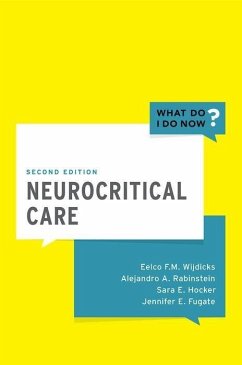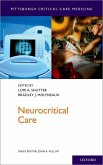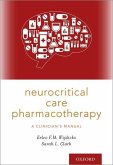- Broschiertes Buch
- Merkliste
- Auf die Merkliste
- Bewerten Bewerten
- Teilen
- Produkt teilen
- Produkterinnerung
- Produkterinnerung
Part of the "What Do I Do Now?" series, Neurocritical Care provides insight into interventions in acute neurologic disorders. Using a case-based approach, this volume emphasizes how to handle comparatively common clinical problems emergently.
Andere Kunden interessierten sich auch für
![Neurocritical Care Neurocritical Care]() Lori ShutterNeurocritical Care108,99 €
Lori ShutterNeurocritical Care108,99 €![Neurocritical Care Pharmacotherapy Neurocritical Care Pharmacotherapy]() Eelco F M WijdicksNeurocritical Care Pharmacotherapy132,99 €
Eelco F M WijdicksNeurocritical Care Pharmacotherapy132,99 €![Neurology Emergencies Neurology Emergencies]() Neurology Emergencies85,99 €
Neurology Emergencies85,99 €![Anesthesiology Critical Care Board Review Anesthesiology Critical Care Board Review]() Anesthesiology Critical Care Board Review212,99 €
Anesthesiology Critical Care Board Review212,99 €![Surgical Neuro-Oncology Surgical Neuro-Oncology]() Surgical Neuro-Oncology191,99 €
Surgical Neuro-Oncology191,99 €![Practical Perioperative Transoesophageal Echocardiography Practical Perioperative Transoesophageal Echocardiography]() Practical Perioperative Transoesophageal Echocardiography186,99 €
Practical Perioperative Transoesophageal Echocardiography186,99 €![Emergency Medicine Board Review Emergency Medicine Board Review]() Emergency Medicine Board Review208,99 €
Emergency Medicine Board Review208,99 €-
-
-
Part of the "What Do I Do Now?" series, Neurocritical Care provides insight into interventions in acute neurologic disorders. Using a case-based approach, this volume emphasizes how to handle comparatively common clinical problems emergently.
Hinweis: Dieser Artikel kann nur an eine deutsche Lieferadresse ausgeliefert werden.
Hinweis: Dieser Artikel kann nur an eine deutsche Lieferadresse ausgeliefert werden.
Produktdetails
- Produktdetails
- Verlag: Hurst & Co.
- 2nd edition
- Seitenzahl: 336
- Erscheinungstermin: 3. Mai 2016
- Englisch
- Abmessung: 233mm x 157mm x 20mm
- Gewicht: 571g
- ISBN-13: 9780190602659
- ISBN-10: 0190602651
- Artikelnr.: 47864472
- Herstellerkennzeichnung
- Libri GmbH
- Europaallee 1
- 36244 Bad Hersfeld
- gpsr@libri.de
- Verlag: Hurst & Co.
- 2nd edition
- Seitenzahl: 336
- Erscheinungstermin: 3. Mai 2016
- Englisch
- Abmessung: 233mm x 157mm x 20mm
- Gewicht: 571g
- ISBN-13: 9780190602659
- ISBN-10: 0190602651
- Artikelnr.: 47864472
- Herstellerkennzeichnung
- Libri GmbH
- Europaallee 1
- 36244 Bad Hersfeld
- gpsr@libri.de
EELCO F. M. WIJDICKS, MD, PhD, FNCS is a Professor of Neurology, the Chair of Critical Care Neurology, and a consultant in the Neurosciences Intensive Care Unit at the Mayo Clinic Campus, Saint Marys Hospital in Rochester, Minnesota. ALEJANDRO A. RABINSTEIN, MD, FNCS is a Professor of Neurology, in the division of Critical Care Neurology, the Medical Director of the Neurosciences Intensive Care Unit, and a Consultant in the Neurosciences Intensive Care Unit at the Mayo Clinic Campus, Saint Marys Hospital in Rochester, Minnesota. SARA E. HOCKER, MD is an Assistant Professor of Neurology in the Division of Critical Care Neurology, the Director of the Neurocritical Care Fellowship Program, and a Consultant in the Neurosciences Intensive Care Unit at the Mayo Clinic Campus, Saint Marys Hospital in Rochester, Minnesota. JENNIFER E. FUGATE, DO is an Assistant Professor of Neurology in the Division of Critical Care Neurology and a Consultant in the Neurosciences Intensive Care Unit at the Mayo Clinic
* Section I: Acute Interventions
* 1. Rapid Progression in Lobar Cerebral Hemorrhage
* 2. Cerebral Hemorrhage and High INR
* 3. Traumatic Brain Injury Arriving in the Emergency Department
* 4. Meningitis Not Improving After IV Antibiotics
* 5. Acute Encephalitis and Abnormal MRI
* 6. A Psychotic Break and Seizures
* 7. Acutely Progressive Dyspnea and Limb Weakness
* 8. Swollen Lips After IV Thrombolysis
* 9. When to Retrieve a Clot in Acute Stroke
* 10. Swollen Ischemic Brain and When to Call the Neurosurgeon
* 11. Cerebral Venous Thrombosis Not Responding to Anticoagulation
* 12. The First Week After Aneurysmal Subarachnoid Hemorrhage
* 13. The Neurointerventionalist and Aneurysmal Subarachnoid Hemorrhage
* 14. A Worrisome MRI Of The Spine and Prior Cancer
* 15. Acute Paraplegia After Aortic Surgery
* 16. When Status Epilepticus Becomes Treatment Refractory
* 17. Medical Options in Brain Metastasis
* 18. Hemorrhage Into a Pituitary Tumor
* 19. Brain Edema and Hypertensive Urgency
* 20. Rare Toxicity After Chemotherapy
* 21. Failure To Awaken After Surgery
* 22. Awake and Then Not Awake After Uncomplicated Brain Surgery
* Section II: Monitoring 101
* 23. When a Spot EEG is Not Enough
* 24. When an Intracranial Pressure Monitor is Helpful
* Section III: Calls, Pages, and Other Alarms
* 25. Wild and Agitated After Acute Abdomen
* 26. Rigidity After Experimenting with Drugs
* 27. Sweating, Fever and Hypertension after Traumatic Brain Injury
* 28. Acute Fever and Profound Shock After Ruptured Cerebral Aneurysm
* 29. Coma and Chest X-Ray White-Out After a Fracture
* 30. When Blood Pressure Needs Control After Stroke
* 31. A Common Cardiac Arrhythmia After Stroke
* 32. Hypertension And Bradycardia in Severe Guillain Barré Syndrome
* 33. Myasthenia Gravis Improved but Not Off the Ventilator
* 34. Decreasing Serum Sodium in Aneurysmal Subarachnoid Hemorrhage
* 35. Increasing Serum Sodium After Surgery for Tumor in The Pituitary
Region
* Section IV: Longterm Support, End Of Life Care, and Palliation
* 36. Care of a Persistently Comatose Teenager
* 37. Withdrawal of Care in an Elderly Person with Catastrophic Brain
Injury
* 38. Not Yet Brain Dead
* 39. When to Mention Organ Donation
* Section V: Principles of Prognostication
* 40. What Neurologists Know About Outcome in Traumatic Brain Injury
* 41. What Neurologists Know About Outcome in Post Resuscitation Coma
* 1. Rapid Progression in Lobar Cerebral Hemorrhage
* 2. Cerebral Hemorrhage and High INR
* 3. Traumatic Brain Injury Arriving in the Emergency Department
* 4. Meningitis Not Improving After IV Antibiotics
* 5. Acute Encephalitis and Abnormal MRI
* 6. A Psychotic Break and Seizures
* 7. Acutely Progressive Dyspnea and Limb Weakness
* 8. Swollen Lips After IV Thrombolysis
* 9. When to Retrieve a Clot in Acute Stroke
* 10. Swollen Ischemic Brain and When to Call the Neurosurgeon
* 11. Cerebral Venous Thrombosis Not Responding to Anticoagulation
* 12. The First Week After Aneurysmal Subarachnoid Hemorrhage
* 13. The Neurointerventionalist and Aneurysmal Subarachnoid Hemorrhage
* 14. A Worrisome MRI Of The Spine and Prior Cancer
* 15. Acute Paraplegia After Aortic Surgery
* 16. When Status Epilepticus Becomes Treatment Refractory
* 17. Medical Options in Brain Metastasis
* 18. Hemorrhage Into a Pituitary Tumor
* 19. Brain Edema and Hypertensive Urgency
* 20. Rare Toxicity After Chemotherapy
* 21. Failure To Awaken After Surgery
* 22. Awake and Then Not Awake After Uncomplicated Brain Surgery
* Section II: Monitoring 101
* 23. When a Spot EEG is Not Enough
* 24. When an Intracranial Pressure Monitor is Helpful
* Section III: Calls, Pages, and Other Alarms
* 25. Wild and Agitated After Acute Abdomen
* 26. Rigidity After Experimenting with Drugs
* 27. Sweating, Fever and Hypertension after Traumatic Brain Injury
* 28. Acute Fever and Profound Shock After Ruptured Cerebral Aneurysm
* 29. Coma and Chest X-Ray White-Out After a Fracture
* 30. When Blood Pressure Needs Control After Stroke
* 31. A Common Cardiac Arrhythmia After Stroke
* 32. Hypertension And Bradycardia in Severe Guillain Barré Syndrome
* 33. Myasthenia Gravis Improved but Not Off the Ventilator
* 34. Decreasing Serum Sodium in Aneurysmal Subarachnoid Hemorrhage
* 35. Increasing Serum Sodium After Surgery for Tumor in The Pituitary
Region
* Section IV: Longterm Support, End Of Life Care, and Palliation
* 36. Care of a Persistently Comatose Teenager
* 37. Withdrawal of Care in an Elderly Person with Catastrophic Brain
Injury
* 38. Not Yet Brain Dead
* 39. When to Mention Organ Donation
* Section V: Principles of Prognostication
* 40. What Neurologists Know About Outcome in Traumatic Brain Injury
* 41. What Neurologists Know About Outcome in Post Resuscitation Coma
* Section I: Acute Interventions
* 1. Rapid Progression in Lobar Cerebral Hemorrhage
* 2. Cerebral Hemorrhage and High INR
* 3. Traumatic Brain Injury Arriving in the Emergency Department
* 4. Meningitis Not Improving After IV Antibiotics
* 5. Acute Encephalitis and Abnormal MRI
* 6. A Psychotic Break and Seizures
* 7. Acutely Progressive Dyspnea and Limb Weakness
* 8. Swollen Lips After IV Thrombolysis
* 9. When to Retrieve a Clot in Acute Stroke
* 10. Swollen Ischemic Brain and When to Call the Neurosurgeon
* 11. Cerebral Venous Thrombosis Not Responding to Anticoagulation
* 12. The First Week After Aneurysmal Subarachnoid Hemorrhage
* 13. The Neurointerventionalist and Aneurysmal Subarachnoid Hemorrhage
* 14. A Worrisome MRI Of The Spine and Prior Cancer
* 15. Acute Paraplegia After Aortic Surgery
* 16. When Status Epilepticus Becomes Treatment Refractory
* 17. Medical Options in Brain Metastasis
* 18. Hemorrhage Into a Pituitary Tumor
* 19. Brain Edema and Hypertensive Urgency
* 20. Rare Toxicity After Chemotherapy
* 21. Failure To Awaken After Surgery
* 22. Awake and Then Not Awake After Uncomplicated Brain Surgery
* Section II: Monitoring 101
* 23. When a Spot EEG is Not Enough
* 24. When an Intracranial Pressure Monitor is Helpful
* Section III: Calls, Pages, and Other Alarms
* 25. Wild and Agitated After Acute Abdomen
* 26. Rigidity After Experimenting with Drugs
* 27. Sweating, Fever and Hypertension after Traumatic Brain Injury
* 28. Acute Fever and Profound Shock After Ruptured Cerebral Aneurysm
* 29. Coma and Chest X-Ray White-Out After a Fracture
* 30. When Blood Pressure Needs Control After Stroke
* 31. A Common Cardiac Arrhythmia After Stroke
* 32. Hypertension And Bradycardia in Severe Guillain Barré Syndrome
* 33. Myasthenia Gravis Improved but Not Off the Ventilator
* 34. Decreasing Serum Sodium in Aneurysmal Subarachnoid Hemorrhage
* 35. Increasing Serum Sodium After Surgery for Tumor in The Pituitary
Region
* Section IV: Longterm Support, End Of Life Care, and Palliation
* 36. Care of a Persistently Comatose Teenager
* 37. Withdrawal of Care in an Elderly Person with Catastrophic Brain
Injury
* 38. Not Yet Brain Dead
* 39. When to Mention Organ Donation
* Section V: Principles of Prognostication
* 40. What Neurologists Know About Outcome in Traumatic Brain Injury
* 41. What Neurologists Know About Outcome in Post Resuscitation Coma
* 1. Rapid Progression in Lobar Cerebral Hemorrhage
* 2. Cerebral Hemorrhage and High INR
* 3. Traumatic Brain Injury Arriving in the Emergency Department
* 4. Meningitis Not Improving After IV Antibiotics
* 5. Acute Encephalitis and Abnormal MRI
* 6. A Psychotic Break and Seizures
* 7. Acutely Progressive Dyspnea and Limb Weakness
* 8. Swollen Lips After IV Thrombolysis
* 9. When to Retrieve a Clot in Acute Stroke
* 10. Swollen Ischemic Brain and When to Call the Neurosurgeon
* 11. Cerebral Venous Thrombosis Not Responding to Anticoagulation
* 12. The First Week After Aneurysmal Subarachnoid Hemorrhage
* 13. The Neurointerventionalist and Aneurysmal Subarachnoid Hemorrhage
* 14. A Worrisome MRI Of The Spine and Prior Cancer
* 15. Acute Paraplegia After Aortic Surgery
* 16. When Status Epilepticus Becomes Treatment Refractory
* 17. Medical Options in Brain Metastasis
* 18. Hemorrhage Into a Pituitary Tumor
* 19. Brain Edema and Hypertensive Urgency
* 20. Rare Toxicity After Chemotherapy
* 21. Failure To Awaken After Surgery
* 22. Awake and Then Not Awake After Uncomplicated Brain Surgery
* Section II: Monitoring 101
* 23. When a Spot EEG is Not Enough
* 24. When an Intracranial Pressure Monitor is Helpful
* Section III: Calls, Pages, and Other Alarms
* 25. Wild and Agitated After Acute Abdomen
* 26. Rigidity After Experimenting with Drugs
* 27. Sweating, Fever and Hypertension after Traumatic Brain Injury
* 28. Acute Fever and Profound Shock After Ruptured Cerebral Aneurysm
* 29. Coma and Chest X-Ray White-Out After a Fracture
* 30. When Blood Pressure Needs Control After Stroke
* 31. A Common Cardiac Arrhythmia After Stroke
* 32. Hypertension And Bradycardia in Severe Guillain Barré Syndrome
* 33. Myasthenia Gravis Improved but Not Off the Ventilator
* 34. Decreasing Serum Sodium in Aneurysmal Subarachnoid Hemorrhage
* 35. Increasing Serum Sodium After Surgery for Tumor in The Pituitary
Region
* Section IV: Longterm Support, End Of Life Care, and Palliation
* 36. Care of a Persistently Comatose Teenager
* 37. Withdrawal of Care in an Elderly Person with Catastrophic Brain
Injury
* 38. Not Yet Brain Dead
* 39. When to Mention Organ Donation
* Section V: Principles of Prognostication
* 40. What Neurologists Know About Outcome in Traumatic Brain Injury
* 41. What Neurologists Know About Outcome in Post Resuscitation Coma








